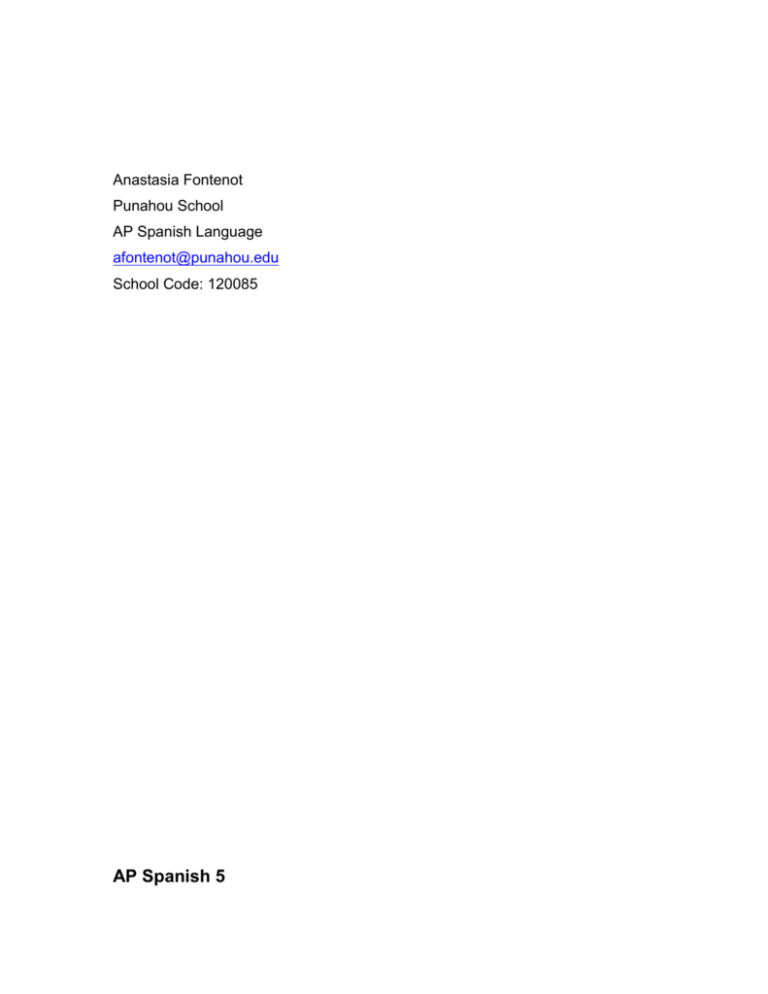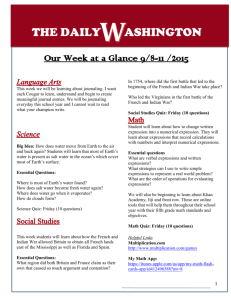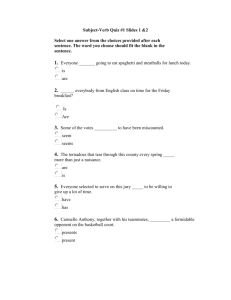
Anastasia Fontenot
Punahou School
AP Spanish Language
afontenot@punahou.edu
School Code: 120085
AP Spanish 5
Course Overview
The AP Spanish Language course is designed to help fine-tune and improve
students' reading, writing, listening and speaking skills in Spanish in preparation
for the AP exam taken in May. AP Spanish Language is an advanced course
and the work done in this class is reflective of that which is done in a 5th or 6th
semester college Spanish course. Therefore, students should be prepared to
work hard. We will review grammar as needed, acquire a wide range of new
vocabulary and idiomatic expressions and read selections of prose and poetry
written by Hispanic authors. We will also read newspaper and magazine articles
and listen to radio broadcasts in Spanish to keep abreast of what is happening in
the Spanish-speaking communities in the U.S. and internationally.
Goals
Students will improve their aural communication skills through discussions
based on relevant topics from the Spanish-speaking world. This includes
casual conversations with their classmates and teacher as well as well as
formal discussions and debates based on written texts and/or aural
sources.
Students will improve and refine their formal and informal writing skills.
Students will improve their formal and informal presentational skills.
Students will broaden their reading skills of both formal and informal texts.
Students will broaden their understanding of the Spanish-speaking
cultures through authentic readings and radio/TV/aural sources.
Students will become familiarized with and prepared for each section of
the AP exam as outlined in the most recent AP Spanish Course
Description.
Main Texts
García Serrano, M. Victoria, Annette Grant Cash, Cristina de la Torre.
sí!. 3rd ed. Boston: Thomson Heinle, 2006.
¡A que
Díaz, José M., Margarita Leicher-Prieto and Gilda Nissenberg. AP Spanish
Preparing for the Language Examination. 3rd ed.
Upper Saddle River:
Pearson Prentice Hall, 2007.
Additional sources/texts
Díaz, José M, María Nadel and Stephen J. Collins. Abriendo Paso Gramática.
Boston: Pearson Prentice Hall, 2007.
Infórmate con CNN. Turner Broadcasting System, Inc., an AOL Time
Warner Company. Thomson Heinle. 2003.
Sample Websites
On-line radio:
Radio UN:
http://radio.un.org/es/
Radio Sources:
http://www.latinworld.com/radio/
Nuevos Horizontes:
http://www.nuevoshorizontes.org/
Yabla:
http://home.yabla.com/
BBC:
http://www.bbcmundo.com
On-line Newspapers:
W/ links to each country in Latin America:
http://lanic.utexas.edu/la/region/news/indexesp.html
España:
http://www.elpais.es/
http://www.abc.es/
Miami:
http://www.miami.com/mld/elnuevo/
Cuba:
del partido comunista:
http://www.granma.cubaweb.cu/
de la prensa independiente:
http://www.cubanet.org/
Argentina: http://eltiempo.terra.com.co/
México: http://www.diariodemexico.com.mx/
Colombia: http://eltiempo.terra.com.co/
Curricular Requirements
C1
The teacher uses Spanish almost exclusively in class and encourages
students to do likewise.
C2
The course provides students with a learning experience equivalent to that
C3
C4
C5
C6
C7
of a third-year college course in Spanish language. Instructional materials,
activities, assignments, and assessments are appropriate to this level.
Instructional materials include a variety of authentic audio and/or video
recordings that develop students' listening abilities.
Instructional materials include authentic written texts, such as newspaper
and magazine articles, literary texts, and other nontechnical writings that
develop students' reading abilities.
The course provides students with regular opportunities, in class or in a
language laboratory, to develop their speaking skills in a variety of
settings, types of discourse, topics, and registers.
The course provides instruction and frequent opportunities to write a
variety of compositions in Spanish.
The course provides frequent opportunities for students to integrate the
four language skills through the use of authentic materials.
Teaching Strategies
This is the year that students attempt to perfect what they have learned until this
point and apply it to discussing and writing about new ideas they learn about
through authentic as well as literary readings, and aural and video sources. In a
totally Spanish atmosphere that is enforced in all honors classes at our school,
the students are eager and comfortable expressing themselves in Spanish. The
challenge of this course lies in their learning a variety of styles, both formal and
informal, of expressing themselves (C1).
The highlight for many students is the AP Language Camp. In the fall the class
spends approximately six hours at a full-immersion language “camp” at a house
on the beach. We play games (Piccionario, for example), do improvisational
skits, prepare food and, of course swim, all while speaking Spanish (C5).
Authentic sources
Our text, ¡A que sí! offers authentic material from a wide variety of sources—
literature, newspapers, magazines, comic strips, advertisements, political
propaganda, health brochures, songs, and films. We discuss and write about the
themes presented in this text. Students often comment on the topics in their
journals. Other authentic sources are integrated as we investigate through online
newspapers and other ciber sources the topics that arise through the year. As
more podcasts and online radio sources in Spanish become available we will
integrate more audio sources into our writings and discussions (C2, C3, C7).
One of the video sources we use is CNN en español. We often watch current
events or documentary or travel type shows to reinforce the concepts we study in
class, as well as use the video from Thomson Heinle which is organized
according to theme.
Student Evaluation
40% Written and aural exams, projects and journals
Written test often include fill-in, multiple-choice and short-answer
sections. From time to time students are evaluated with a partial
AP-style test, principally in the second semester.
Projects may include group presentations, research, class
discussions/debate, etc (C5).
Journals must include a minimum of 150 words per entry and three
entries per six-day cycle. Journals are evaluated on the effort given
and length and number of entries. The topics are usually open but
they also are asked at times to include at least one entry as a
reaction to a topic discussed in class or a reading. (C6)
20% Quizzes
Usually focused on grammar or vocabulary that has been
presented/reviewed. Students are tested in a combination of
discrete and open-ended fashion. Vocabulary lists include idiomatic
and thematic vocabulary, principally from the AP prep book.
Occasionally a reading comprehension or listening comprehension
section from a previous AP exam is given as a quiz, usually in the
second semester.
15% Participation/preparation
A grade given each six-day cycle that evaluates the active
participation in class discussions and consistent preparation for
class. Students on occasion fill out a self-evaluation form to give
themselves a grade and explain why they perceive their
participation to be at that level. The teacher then responds and
gives the final grade. This keeps student and teacher in
communication about what is perceived to be good participation.
25% Homework/Compositions
The daily written assignments are reviewed in class, while
compositions, done in several drafts, are corrected with symbols
and revised. Students write three to four compositions per semester
and the format is usually based on the style of the new 2007 exam
(C6). Students read two written sources and listen to an audio
source, usually in the language lab. They then redact a thesis-style
paper in which they integrate information form the three sources.
Year Plan
(We meet four times each 6-day cycle)
Cycle 1
-Assign and quiz vocabulary and idiomatic expressions
-Review Verb form: present, preterit, imperfect, present perfect, pluperfect
-Informal writings (Letters, emails)
-Take diagnostic exam
Cycle 2
-Assign and quiz vocabulary and idiomatic expressions
-Assign and redact Composition 1 (Formal writing w/ integrated skills)
-In language lab: practice a sample of speaking parts of exam
-Exam Grammar
Cycle 3
-Assign and quiz vocabulary and idiomatic expressions
-Readings: ¡A que sí! (Bares a millares, Picar a la española) (Discuss, write
reactions, share)
-Turn in journals 1 (9 entries)
Cycle 4
-Assign and quiz vocabulary and idiomatic expressions
-Readings: ¡A que sí! (El secreto a voces. una fiesta de impacto) (Discuss, write
reactions, share)
-Review nouns, gender, accents
-2 article presentations from online newspapers
-In language lab: practice a sample of speaking parts of exam/Listening
Comprehension
Cycle 5
-Assign and quiz vocabulary and idiomatic expressions
-Read, Discuss “A la deriva”
-Review adjectives, possessives, demonstratives, interrogatives
-Oral presentation of articles, debate
-Informal writings
Cycle 6
-Assign and quiz vocabulary and idiomatic expressions
-Assign and redact Composition 2 (Formal writing w/ integrated skills)
-In language lab: practice a sample of speaking parts of exam/listening
comprehension
-Read, discuss ¡A que sí!: “La santería” (Ver video)
-Exam 2 (Grammar)
Cycle 7
-Assign and quiz vocabulary and idiomatic expressions
-Poetry: 2 poems by Neruda (Read, recite, discuss, listen to recording of Neruda)
- Informal writings in class
-Review uses of “se” (reflexive, passive, indirect object)
-Turn in Journals 2
Cycle 8
-Assign and quiz vocabulary and idiomatic expressions
-In language lab: practice a sample of speaking parts of exam/listening
comprehension
-Poetry: 4 poems by Nicanor Parra (Read, recite, discuss, see video)
- Read, discuss ¡A que sí! (El barrio)
-Exam “se”
- In-class essay
Cycle 9
-Assign and quiz vocabulary and idiomatic expressions
-Read, discuss ¡Aque sí!: “Los estereotipos”
-Assign and redact Composition 2 (Formal writing w/ integrated skills)
- Informal writings in class
-Turn in Journals 3
Cycle 10
-Assign and quiz vocabulary and idiomatic expressions
-In language lab: practice a sample of speaking parts of exam/listening
comprehension
-Read, discuss ¡A que sí!: (El eclipse) (Gitanos)
-AP readings, Cloze exercises
Cycle 11
-Assign and quiz vocabulary and idiomatic expressions
-Read, discuss ¡Aque sí!: (Texto libre de prejuicios sexuales)
Cycle 12
-Assign and quiz vocabulary and idiomatic expressions
-Assign and redact Composition 3 (Formal writing w/ integrated skills)
-AP readings, Cloze exercises
--In language lab: practice Listening Comprehension (AP)
-Read, discuss ¡A que sí!,(Palabreo)
Cycle 13
-Group presentations (on a chosen historical, social or cultural topic)
-Turn in Journals 4
Cycle 14
-AP readings, Cloze exercises
-Prepare for final exam
Cycle 15
-Assign and quiz vocabulary and idiomatic expressions
-Practice formal/informal speaking in language lab
-Assign and redact Composition 4 (Formal writing w/ integrated skills)
-Read, discuss poetry of Lorca: “Romance sonámbulo, Canción de jinete”, write
reaction
-Informal writing
Cycle 16
-Assign and quiz vocabulary and idiomatic expressions
-Practice formal/informal speaking in language lab
-AP readings, Cloze exercises
-Read poem/Lorca: “La casada infiel,” write reaction, share
-Review: Subjunctive uses, forms present tense
-Turn in Journals 5
Cycle 17
-Assign and quiz vocabulary and idiomatic expressions
-Practice formal/informal speaking in language lab
-View video:Lorca
-Review: Subjunctive uses, forms past tense
-Exam: poetry
Cycle 18
-Assign and quiz vocabulary and idiomatic expressions
-Practice formal/informal speaking in language lab
-AP readings, Cloze exercises
-Read, discuss ¡A que sí!: “La cocina de zumbagua”
-Finish review/subjunctive
-Exam: subjunctive
Cycle 19
-Assign and quiz vocabulary and idiomatic expressions
-Practice formal/informal speaking in language lab
-Assign and redact Composition 5 (Formal writing w/ integrated skills)
-Read, discuss ¡A que sí!: “La brecha”
-Turn in Journals 6
Cycle 20
-Assign and quiz vocabulary and idiomatic expressions
-Practice formal/informal speaking in language lab
-AP readings, Cloze exercises
-Read, discuss ¡A que sí!: “Los derechos humanos y la cultura de terror”
Cycle 21
-Assign and quiz vocabulary and idiomatic expressions
-Practice formal/informal speaking in language lab
-Read, discuss ¡A que sí!:”Tres héroes”
-AP readings, Cloze exercises
-Practice AP exam
Cycle 22
-Assign and quiz vocabulary and idiomatic expressions
-Read, discuss ¡A que sí!: “La malinche”
-Practice formal/informal speaking in language lab
-AP readings, Cloze exercises
-Practice AP exam
Cycle 23
-Assign and quiz vocabulary and idiomatic expressions
-Practice formal/informal speaking in language lab
-Read, discuss ¡A que sí!: “Preso sin nombre, celda sin número”
-Assign and redact Composition 6 (Formal writing w/ integrated skills)
-Turn in Journals 7
Cycle 24
-Assign and quiz vocabulary and idiomatic expressions
-Practice formal/informal speaking in language lab
-AP readings, Cloze exercises
-Re-take diagnostic exam
Cycle 25
-Tie up loose ends before AP exam







